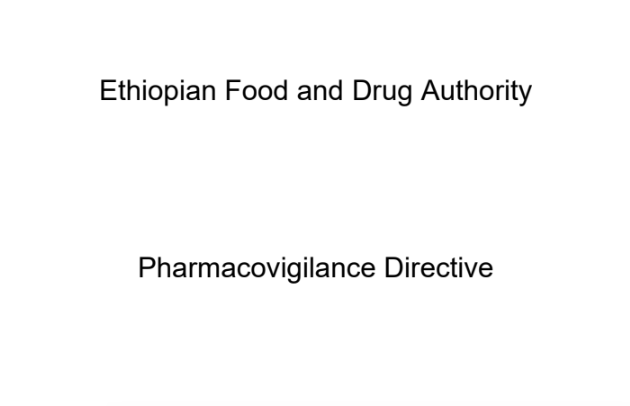Fill out the form below to receive the complete PDF guide directly in your inbox. This resource provides clear, step-by-step guidance to help you make the most of the information we’ve prepared for you.
Ethiopia
Pharmacovigilance Directive
This 2020 directive from the Ethiopian Food and Drug Authority (EFDA) establishes a legally binding framework for all pharmacovigilance activities in the country, implementing Proclamation No. 1112/2019. It mandates strict reporting timelines for adverse drug events, requiring serious events to be notified within 24 hours and reported within 48 hours. The directive legally obligates Marketing Authorization Holders to establish a PV system, appoint a Qualified Person for Pharmacovigilance (QPPV) resident in Ethiopia, and submit PSURs and RMPs, clarifying roles for all stakeholders.

Use Cases
- Marketing Authorization Holders (MAHs) – Comply with Legal PV Obligations: To establish a full pharmacovigilance system, appoint a QPPV who resides in Ethiopia, and adhere to strict reporting timelines for ADEs, PSURs, and RMPs as a condition of market authorization.
- Healthcare Professionals – Fulfill Mandatory Reporting Duties: To report serious ADEs within 48 hours and non-serious ADEs within 7 working days, using one of the official channels such as the yellow form, toll-free line, or MedSafety mobile app.
- Healthcare Facilities – Establish an Internal PV System: To create and run a pharmacovigilance system, assign a focal person to coordinate ADE monitoring, and ensure all healthcare staff are involved in detecting, reporting, and preventing adverse events.
- Ethiopian Food and Drug Authority (EFDA) – Enforce and Coordinate National PV: To use the directive as the legal basis for receiving and investigating ADE reports, analyzing signals, taking regulatory actions, and coordinating all national pharmacovigilance partners.
- Patients/Consumers – Report ADEs Directly: To report experienced adverse drug events directly to the authority using the toll-free number (8482) or other consumer-friendly reporting tools made available by EFDA.
- Academic Institutions – Integrate PV into Curricula: To incorporate the science of pharmacovigilance into the training curricula for medicine, pharmacy, and other health professional students to build national capacity.
Key takeaways you'll learn
The resource’s purpose is to create a legally enforceable and modern pharmacovigilance system in Ethiopia by providing a clear, detailed directive that defines the obligations, processes, and timelines for all stakeholders to ensure the safety of medicines.
- Legally Binding Framework: This directive moves Ethiopia’s pharmacovigilance system from a guideline-based approach to a legally enforceable one, with penalties for non-compliance, particularly for healthcare professionals and MAHs.
- Strict and Rapid Reporting Timelines: It introduces mandatory and strict timelines for reporting, requiring that serious adverse events be notified within 24 hours and fully reported within 48 hours.
- Mandatory QPPV in Ethiopia for MAHs: The directive legally obligates every Marketing Authorization Holder to appoint a Qualified Person Responsible for Pharmacovigilance (QPPV) who is resident in Ethiopia, ensuring local accountability.
- Modernized Reporting Channels: It officially incorporates modern reporting tools, including a dedicated toll-free telephone number (8482), an e-reporting web portal, and the MedSafety mobile application, to facilitate easier reporting for both professionals and consumers.
- Requirement for Active Surveillance: The directive formally includes a provision for the EFDA to conduct active surveillance (e.g., sentinel site monitoring) for high-priority medicines, moving beyond a purely passive, spontaneous reporting system.


